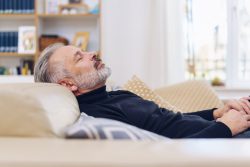I Have Sleep Apnea — Is It Okay to Take a Nap?
April 2, 2022
For most people, napping is harmless. In fact, it can have some pretty significant benefits. Whether you need a burst of energy to power through an afternoon slump or just want to lie down before dinner, indulging in some midday shuteye can be a big help. Unfortunately, though, napping is not always a good idea for sleep apnea sufferers. In fact, napping and sleep apnea in Boca Raton often have a negative relationship. Let’s talk more about how they affect one another and how you may be able to enjoy higher-quality nighttime rest.
Napping and Sleep Apnea
There are a few notable dangers that napping presents to individuals with obstructive sleep apnea:
- If you lie down for a short nap, you may decide not to use your CPAP or oral appliance. Therefore, you are likely to experience numerous pauses in breathing while you are asleep. You may wake up feeling even more exhausted than when you began your nap.
- Napping often makes it more challenging to fall asleep at night, which is when you are more likely to use your OSA treatment. If you haven’t yet adjusted to your OSA device, you may end up tossing and turning with it for hours before you finally drift off. That can be uncomfortable and may affect your future compliance with your treatment.
Benefitting from Napping
OSA sufferers do not have to abstain from napping altogether. However, if you choose to nap, try not to sleep for more than 30 minutes or so. You will not enter the deeper stages of sleep, making it less likely that your nap will interfere with your nighttime rest.
Also, try to use your OSA treatment if possible. This is much easier if you use an oral appliance instead of a CPAP machine. Oral appliances are easy to take with you, so you can easily use it if you shut your eyes for a power nap in your car or nap on your sofa instead of your bed.
Improve the Quality of Your Nighttime Rest
Whether or not you choose to nap, the quality of your nighttime rest is of paramount importance. Here are some tips to get the most out of your nocturnal shuteye:
- Avoid alcohol and caffeine in the hours before bedtime.
- Do not use your phone in bed. In fact, you should stop using electronic devices at least an hour before you lie down.
- Monitor your OSA symptoms and report any changes to your treatment provider.
- Make sure your bedroom is clean, comfortable, and slightly on the cool side.
- Train your body to go to bed at the same time each night.
Napping can be beneficial, but only if you comply with your OSA treatment. Use the tips in this article to get more out of both your daytime and nighttime rest.
About the Author
Dr. Kenneth Mogell is double-board certified in dental sleep medicine. He has many years of experience in helping patients fight OSA and snoring. He focuses primarily on providing oral appliance therapy. If you would like to talk to him about how you can improve the quality of your rest, contact any of our convenient locations or call our Boca Raton office at 561-353-5252.
